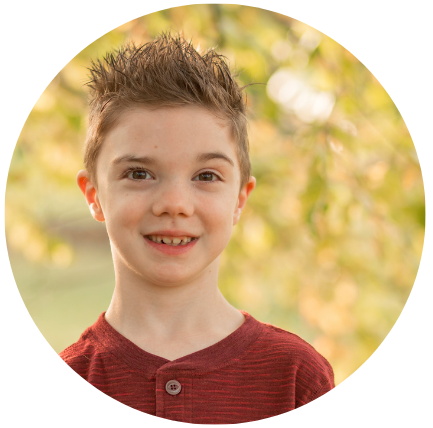Getting an early and accurate diagnosis can be the difference between a life fighting to survive and one filled with adventures and joy.
It was when Walter was approaching his first birthday that Erin felt that something was wrong with her son. He wasn’t meeting the developmental milestone of other children his age and his lips would turn blue when he cried.
Getting the proper diagnosis was hard – really hard.
Erin says she brushed off the early signs that something was wrong. At 12 months, he couldn’t sit up and had no words. We kept telling ourselves that boys develop more slowly. We thought he’d catch up.
 When Walter didn’t pass an auditory test, the real search for answers began. “The first diagnosis we were given was cerebral palsy,” says Erin. “I remember being angry and feeling like we’d been brushed off after a very short consult. I was convinced the diagnosis was wrong. Although I did not believe my son had cerebral palsy,” adds Erin, “I did know that he needed help.”
When Walter didn’t pass an auditory test, the real search for answers began. “The first diagnosis we were given was cerebral palsy,” says Erin. “I remember being angry and feeling like we’d been brushed off after a very short consult. I was convinced the diagnosis was wrong. Although I did not believe my son had cerebral palsy,” adds Erin, “I did know that he needed help.”
Walter was referred to KidsAbility, a wonderful organization in Guelph, Ontario that helps kids reach their communication, social, physical and behavioral goals. A physiotherapist who worked with Walter, said that she too believed the initial diagnosis was wrong. She suggested he be seen by a developmental pediatrician at McMaster Children’s Hospital in Hamilton, Ontario.
Erin agreed to the consult which led to a series of tests, diagnosis by Dr. Mark Tarnopolsky, and the rewriting of Walter’s future. After blood work, a muscle biopsy, MRI, CT and genome sequencing, it was confirmed that Walter had Leigh syndrome resulting from a spontaneous mitochondrial DNA mutation. He was two-and-a-half years old.
Erin headed back to her computer to gather more information after the second diagnosis. What she read, scared her. “It didn’t take long to learn,” Erin recalls, “that Leigh’s was one of the really bad mitochondrial diseases.”


 Life is good but not easy for Walter, who is now eight years old. He has braces to help him walk and sometimes needs to use a walker. He struggles with fine motor skills and lacks muscle control in his mouth, so he speaks slowly. And, when Walter gets sick with common colds or ailments, it takes him much longer to recover.
Life is good but not easy for Walter, who is now eight years old. He has braces to help him walk and sometimes needs to use a walker. He struggles with fine motor skills and lacks muscle control in his mouth, so he speaks slowly. And, when Walter gets sick with common colds or ailments, it takes him much longer to recover.